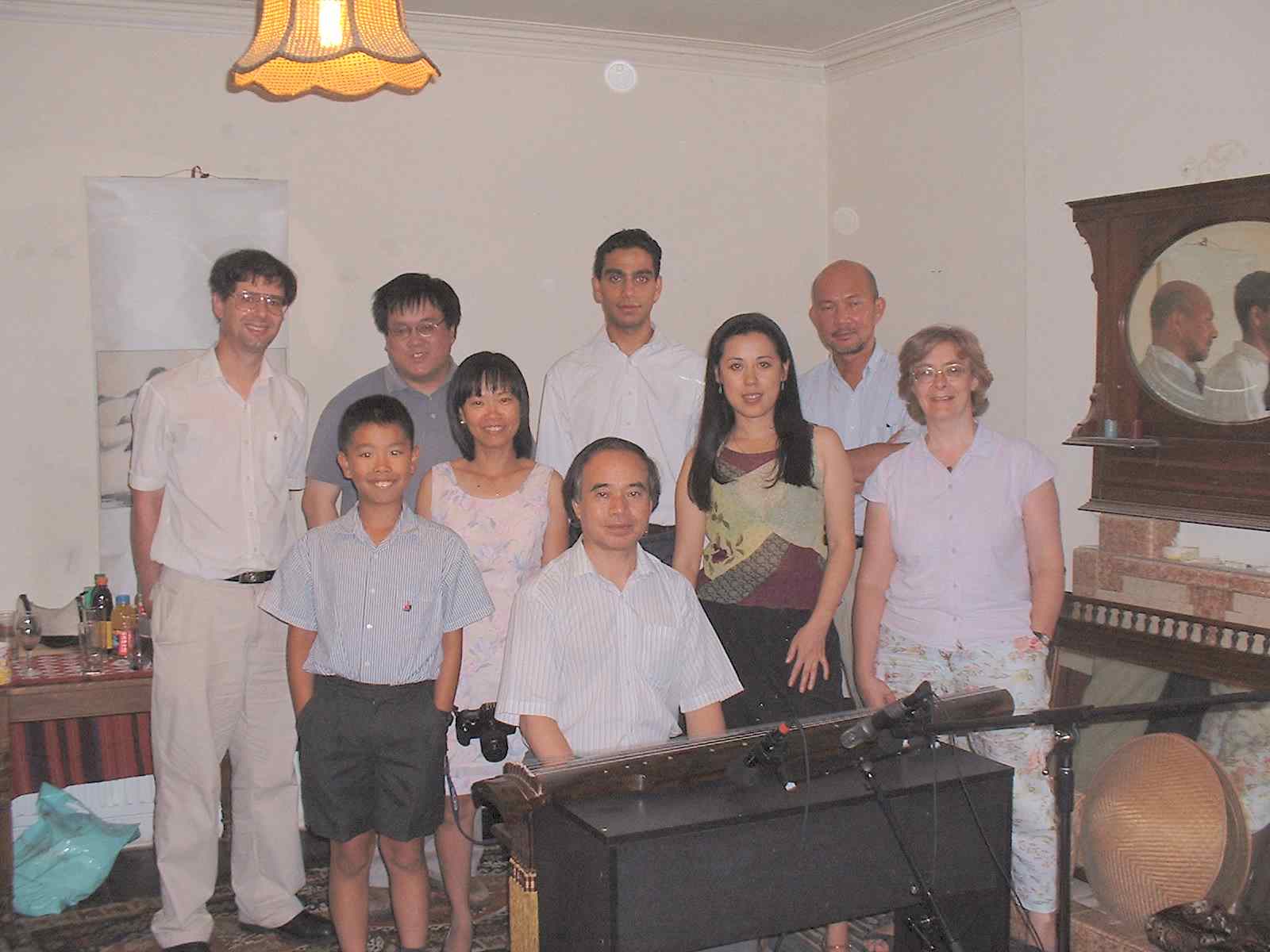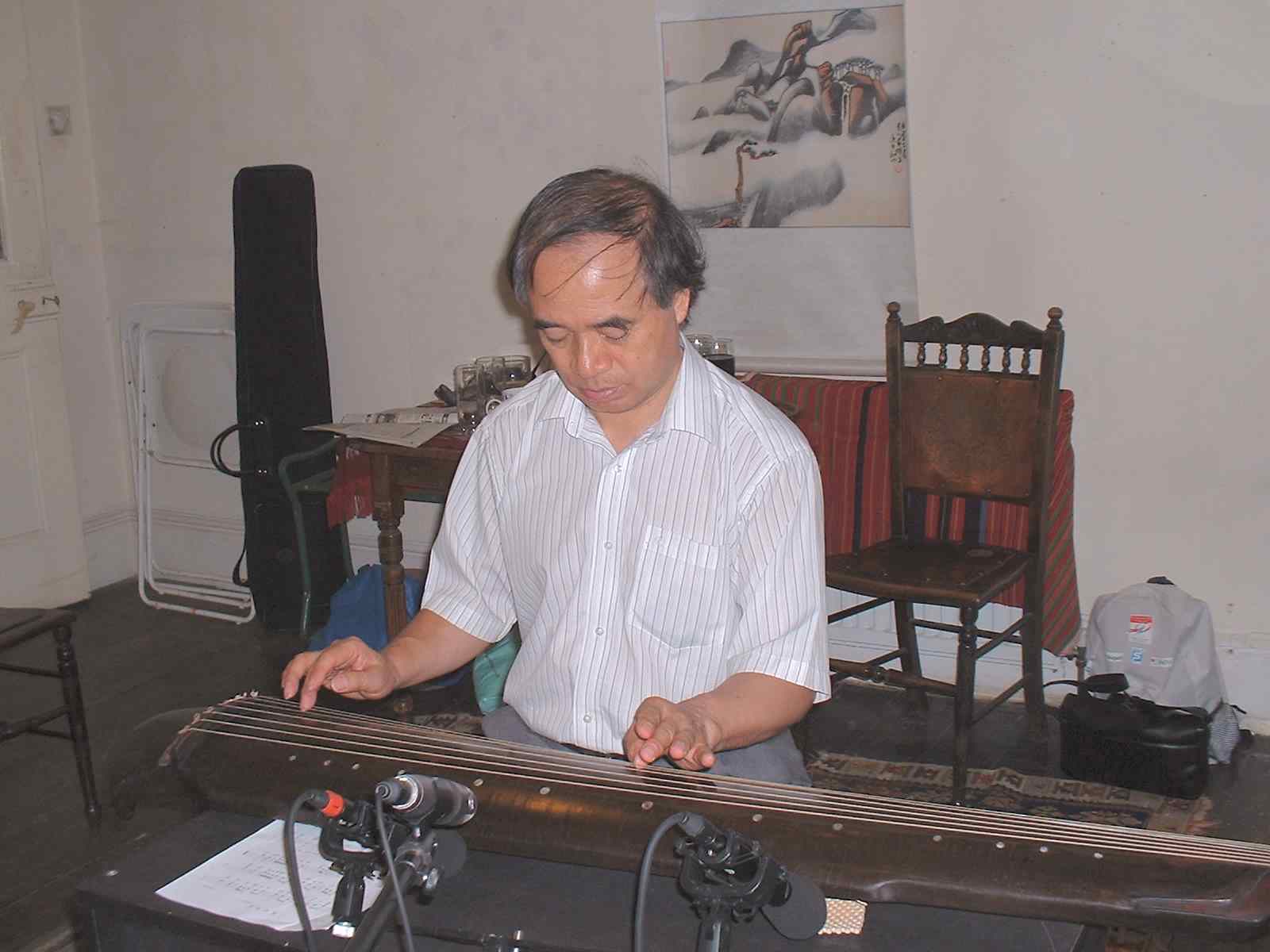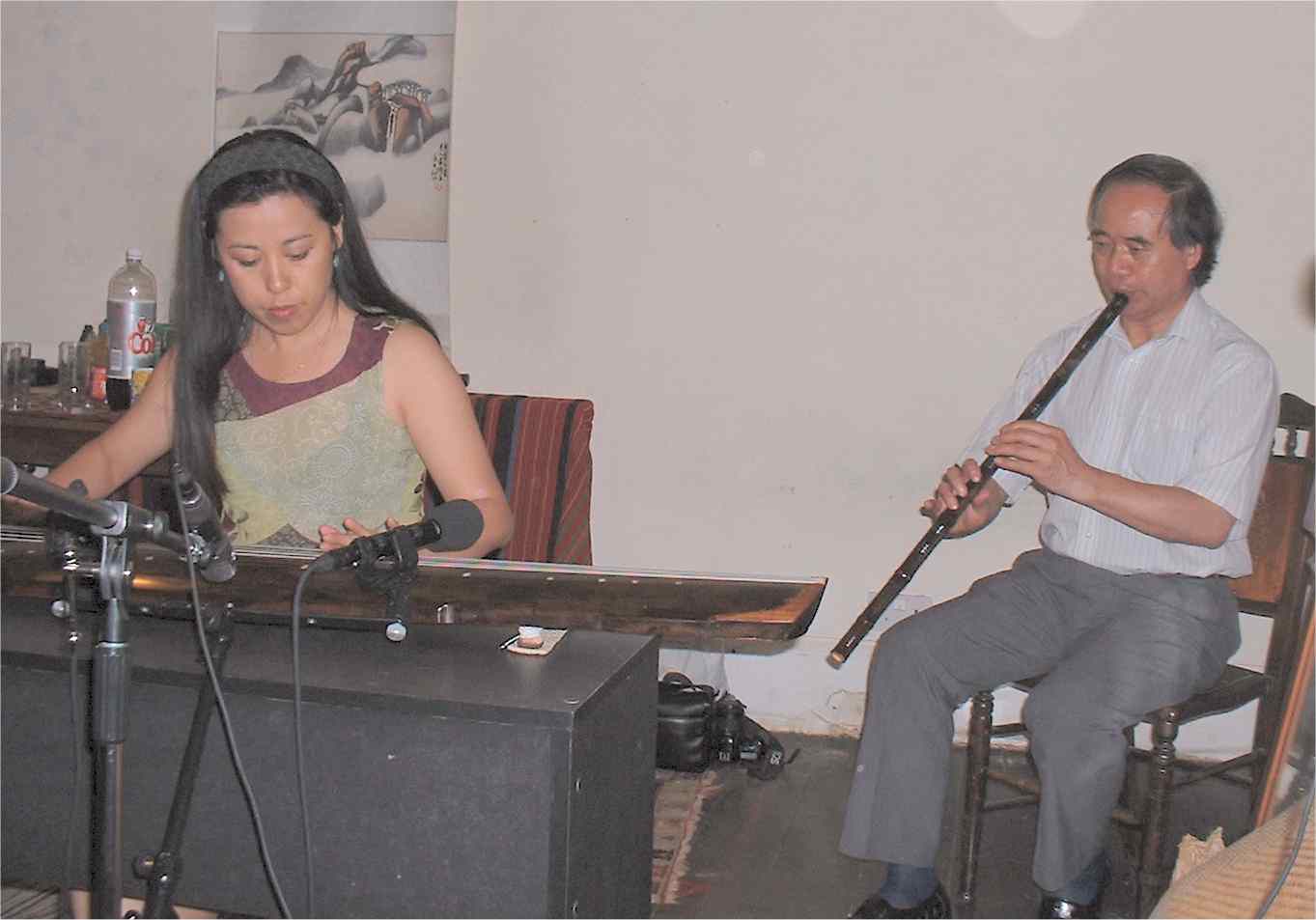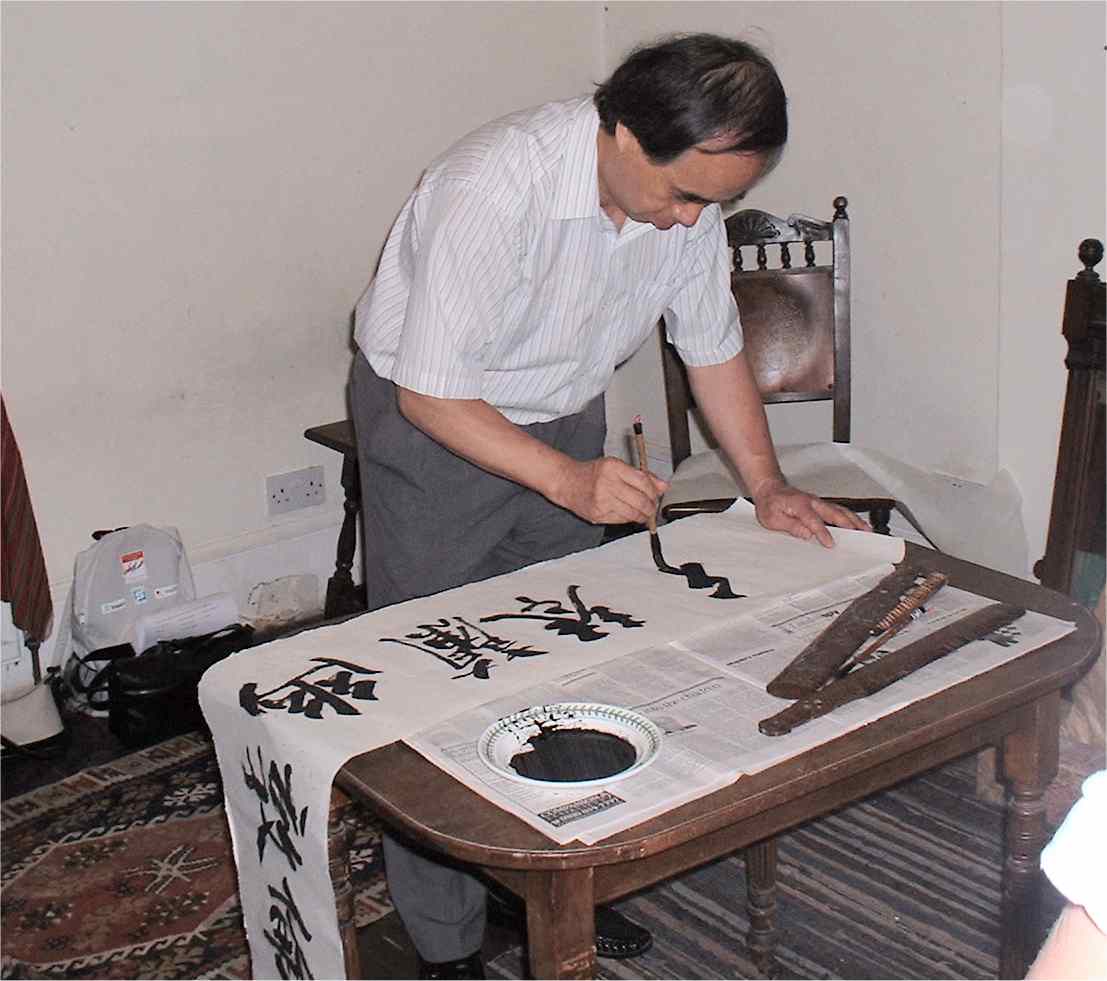Yaji 13th August 2003
To welcome renowned qin master Professor Li Xiangting to the London
Youlan
Qin society.
Venue
The home of Sarah Moyse, London TW1.
Attendees
-
Cheng Yu - played Guanshan Yue; Changmen Yuan
-
Caroline Firman - played Kanding Qingge
-
Dan Nung Ing - played Qiu Feng Ci; Pingsha Luo Yan
-
Julian Joseph - played Tian Lai
-
Li Xiangting - played:
-
Improvisation (xiao);
-
Pingsha Luo Yan (on Dan Nung Ing's silk-string qin)
-
Qiu Feng Ci (on Dan Nung Ing's silk-string qin)
-
Pingsha Luo Yan
-
Yi Guren
-
You Lan
-
Guangling San
-
Guanshan Yue (xiao, duet with Cheng Yu (qin)
-
John Man
-
Sarah Moyse
-
Michael McCartney
-
Chin-wee Tan - played Yi Guren; Changmen Yuan
-
Ee Meng Tan
-
Bryant Tan
-
Peter Sahota
-
Jacqueline

Minutes
-
The meeting began informally, with general conversation and the playing
of qin pieces by society members.

-
Cheng Yu welcomed Li Xiangting. She also announced that an article
about the launch of the London Youlan Qin Society had been published
in the European edition of the Singtao Daily, and showed us copies.
-
Li Xiangting said it was rare to meet so many qin enthusiasts outside
China. It would have been unimaginable in the past and represents progress
for humanity as a whole, not just for the qin. Qin was one
of the four arts of the Chinese scholar - the other three being chess,
calligraphy and ink painting. He then explained what a yaji is.
Ya
means 'elegant', and ji is a gathering. So literally, a yaji
is an "elegant gathering" - a little like a French salon. The earliest
yajis
were the gatherings held by the Seven Sages of the Bamboo Grove during
the Jin Dynasty. 265-420AD). As far as music is concerned, the term has
only been applied to the qin, never to other instruments. This is
because only the qin was played by the literati who attended them.
Other instruments were were generally not played by the literati (for a
short time during the Tang Dynasty (618-907AD), the pipa did enjoy
similar status with the royal family). The term was also applied to poetry
gatherings, and during the 1950's, to gatherings of kun opera musicians.
The word yaji was coined, not by the people who attended such gatherings,
but by those who perceived them to be "elegant".
The first formal qin society, the Jinyu Qinshe, was formed
during the 1920's and 1930's by qin masters Zha Fuxi and Guan Pinghu.
Initially they had weekly meetings, but they soon became monthly. Anyone
could attend, and there was no membership charge, the only requirement
being an interest in qin or even in Chinese culture generally. At
these meetings one could discuss opinions on scholarly matters and one's
feelings about qin music. There are now two major qin societies
in China: the Jinyu Qinshe in Shanghai and the Beijing Guqin
Yanjiu Hui in Beijing, both of which hold monthly meetings, called
yueji
(monthly gatherings) rather than yaji.
-
By popular request, Li Xiangting played You Lan and explained its
background. The piece comes to us from a 6th century score found
in a temple in Kyoto, Japan. It is closely associated with Confucius. He
travelled to various states in China, attempting to promote his ideas of
ethics and virtue as an ideal of government, but was constantly rejected.
One day he saw an orchid growing alone among ordinary plants. He likened
it to a wise man whose ideas are not in tune with the time, and who consequently
associates with the common people. The score was written by a Tang artist
and qin player, and consists of instructions in Chinese on how to
play the piece, and not of qin notation as used for later pieces.
Professor Li thinks the piece may have been composed before the Tang Dynasty.
The piece is musically very different from all other extant qin
compositions. The development of some melodic trends is very similar to
post 1850's Western atonal music - Professor Li demonstrated a couple of
example passages to illustrate this. Professor Li said that this similarity
between music from two very different cultures at widely separated times
(ancient Chinese and post-Romantic Western) is due to the common thread
of humanity that binds all cultures together.

Another important point about qin music is that it tries to
express philosophical and literary ideas. Music is not a natural medium
for this, and again, it somehow brings out the commonality between different
peoples. Qin music is thus a part of the human heritage as a whole,
not just that of China. It has attained a high degree of refinement, but
is not so esoteric as to be inaccessible - sacred but not holy, not excessively
detached from everyday life, profound but not mysterious. In China, people
have tried to make Confucianism into a religion, even though it was originally
nothing more than a system of thought, ethics and philosophy for good government.
Treating it as a religion defeats its purpose. Similarly, the qin
should not be treated as mysterious and inaccessible, as it often has been
in the past.
-
Li Xiangting played Guangling San and explained its background.
It dates from the Han Dynasty (206BC-220AD). It represents a kind of righteousness
- upholding the truth, protecting the weak, or in this case, avenging one's
fathers death, even if a crime is committed in the process. This version
is based on the 1425 score in the Shenqi Mipu tablature collection,
and is very difficult to play.
Since ancient times Guangling San has been condemned for being military
in style, and thus against the four canons of qin music:
- qing - light
- wei - not heavy
- dan - no strong emotions; not much expression
- yuan - distant, remote.
However most qin pieces played today violate these canons to varying
degrees, including You Lan. Professor Li demonstrated the effect
of taking these ideas to their logical conclusion, as advocated by the
Tang Dynasty poet Bai Juyi. Bai Juyi maintained that, in addition to these
four canons, a slow qin piece should be played even more slowly,
and that a qin piece should contain less than 20 notes. Techniques
such as yin, nao, zhu, zhuo, lun, etc were unacceptable as they
were too expressive. He did not like to be heard playing the qin.
He was very happy when no one wanted to hear him: this meant he had attained
such a high standard that nobody wanted to listen to him!
-
Cheng Yu (qin) and Li Xiangting (xiao) played Guanshan
Yue as a qin-xiao duet.

-
Cheng Yu and Chen Jinwei both played Changmen Yuan. The theme of
this piece is similar to that of the pipa piece Zhaojun Chu Sai.
In imperial China, the Emperor officially possessed 81 women: one senior
wife, two junior wives, 6 consorts and 72 concubines. Many of these court
ladies were neglected and trapped in the palace all their lives. The emperor
decided on the basis of pictures whom he would see, so they often bribed
the court painter to paint flattering portraits of themselves. The music
describes the anguish of Chen Ajiao after she fell from favour and was
exiled to the Changmen Palace.
-
Li Xiangting wrote some beautiful calligraphy for the London Youlan
Qin Society and gave one to each member present. A part of it appears
on the entry page of this web site.

Copyright the London Youlan Qin Society, July 2003.
All rights reserved.


